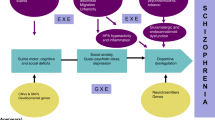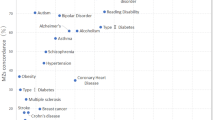Abstract
In the post Genome era, the aim of behavior genetics has shifted from estimating the relative contributions of genes and environmental factors to (co-)variation in human complex traits, to localization of genes and identification of functional genetic variants. This special issue reflects this transition and presents fifteen papers that report on genome-wide linkage scans for complex traits in humans and on methodological tools and innovations. Six papers focus on cognition and report overlapping linkage peaks on chromosomes 6p and 14p. Papers on addictive behavior, i.e. smoking and alcohol dependence and its endophenotypes, find moderate LOD scores on chromosomes 6p, 5q, 4p and 7q, respectively. Three papers concentrate on emotionality, depression and loneliness and examine chromosomes 2q and 12q. The papers in this issue represent a summary of the first large scale linkage enterprises of human behavioral traits.
Similar content being viewed by others
References
Comings D. E., Wu S., Rostamkhani M., McGue M., Lacono W. G., Cheng L. S., et al. (2003). Role of the cholinergic muscarinic 2 receptor (CHRM2) gene in cognition. Mol. Psychiatry 8:10–11
Gosso, M. F., van Belzen, M., de Geus, E. J. C., Polderman, J. C., Heutink, P., Boomsma, D. I. and Posthuma, D. Family based association testing provides further evidence for a role of the CHRM2 gene in cognition. Genes Brain Behav., in press.
Lander E., Kruglyak L. (1995). Genetic dissection of complex traits: guidelines for interpreting and reporting linkage results. Nat. Genet. 11:241–247
Porjesz B., Begleiter H. (2003). Alcoholism and human electrophysiology. Alcohol Res. Health 27(2):153–60
Posthuma D., Luciano M., Geus E. J. C., Wright M. J., Slagboom P. E., Montgomery G. W., Boomsma D. I., Martin N. G. (2005). A Genomewide Scan for Intelligence Identifies Quantitative Trait Loci on 2q and 6p. Am. J. Hum. Genet. 77:318–326
Author information
Authors and Affiliations
Corresponding author
Rights and permissions
About this article
Cite this article
Posthuma, D., Cherny, S. & Boomsma, D. Introduction to the Special Issue: Human Linkage Studies for Behavioral Traits. Behav Genet 36, 1–3 (2006). https://doi.org/10.1007/s10519-005-9010-2
Published:
Issue Date:
DOI: https://doi.org/10.1007/s10519-005-9010-2




